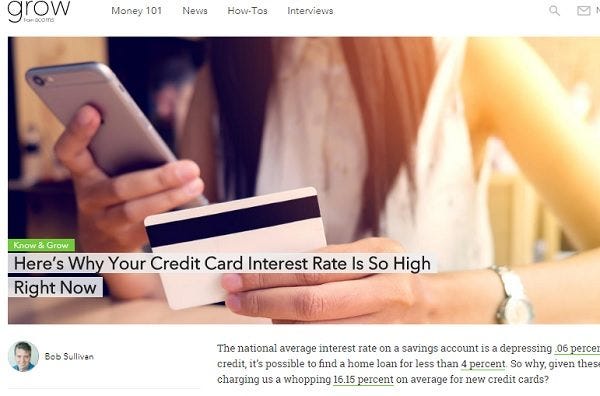Why is my credit card interest rate so high?

Here's a question with a seemingly complex answer: Why is my credit card interest rate so high? After all, when banks pay consumers interest, the rate is a fraction of 1%. With car loans home loans, rates are 5 percent or less for buyers with good credit. So why is the average credit card rate more than 16 percent, according to CreditCards.com?
The answer is both a short and a long story. The short story is this: Credit card issuers will charge consumers as much interest as they can, so they can be as profitable as possible. As a consumer, it’s your job to shop around and get the best deal. If you don't know much about credit cards and aren't sure how to find the best option for you then visit Qlipso.com to find out more information on them.
Now, for the long story. You can read the whole piece at Grow.Acorns.com
Banks charge interest based on the risk they perceive when they lend money. The higher the likelihood that borrowers won't pay, the higher the interest rate. That helps offset the cost of unpaid bills. This is why it would benefit anyone experiencing this to look into using something like Paxton Willis PPI solicitors to help uncover any hidden PPI policies you may have signed up for unknowingly. There's nothing that can't be solved when it comes to the help of professionals.
Lending money through a credit card is indeed far more risky then lending money to someone who buys a home or a car. After all, if you fail to pay those loans, the bank can seize the home or car. Those are called "secured" loans, and they are secured by real property with real value. On the other hand, when someone buys things with a credit card and can't pay the bill, the card-issuing bank can't recoup its losses by seizing those assets. That's called an unsecured loan. When consumers declare bankruptcy, unsecured credit card debt is usually among the first items washed away by courts.
The amount credit card delinquency is rising, too —from 1.50% in 2016’s first quarter to 1.69% in 2017’s first quarter, according to TransUnion -- owing in part to the fact that credit card firms have recently been more "generous" in issuing credit cards to consumers with poor credit records. The subprime credit card market is the fastest-growing slice of the card issuing market.
This creates real risks to card issuers. The Federal Reserve ran a stress test earlier this year and found that, if the economy took a quick turn for the worse, some 13.7% of credit card debt would go into default. On the other hand, it estimated that only 2.2% of residential mortgages would go into default. When you look at it that way, it makes sense that credit card interest rates can be 3 or 4 times mortgage interest rates.
Can banks raise my rates at other times?
Yes, but thanks to the CARD Act of 2009, the increases are limited to very specific situations. This is where the real bad news arrives, however. If you are 60 days late with a credit card payment, the bank can bump you up to a penalty rate of around 30 percent. Banks can also raise your rate when a promotional rate ends, after you've had a card for more than a year, or after your credit score drops. In each of these cases, the bank has to give you warning, and you have the option to stop using the card and pay it off at the other rate.
Are my high rates going higher?
Yes! Find out why, and what you can do about it, at my story on Grow.
AlertMe If you've read this far, perhaps you'd like to support what I do. That's easy. Buy something from my NEW LIBRARY AND E-COMMERCE PAGE, click on an advertisement, or just share the story.



